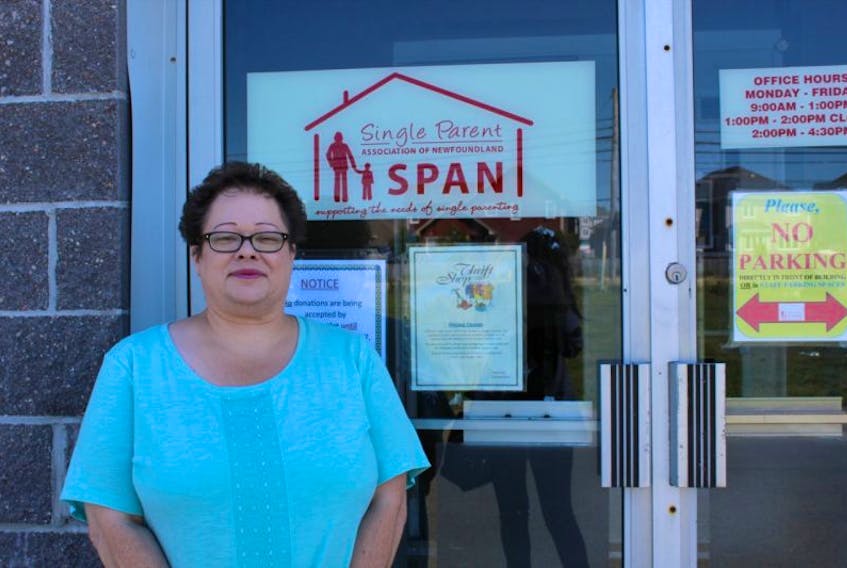The Single Parent Association of Newfoundland and Labrador (SPAN) needs more money.
While there is no danger of the association closing, it is cash-strapped, according to executive director Elaine Balsom. She is looking for $120,000 to run the SPAN office, up from the current allocation of $20,000 it has received for the past 10 years from the Department of Children, Seniors and Social Development (CSSD).
She also receives an approximate $25,000 in an administration fee from the Department of Advanced Education, Skills and Labour (AESL) for running the Single Parent Employment Support Program (SESP), a pre-employment program for single parents receiving income support. Money from both departments is used to cover SPAN’s operating costs. The Single Parent Association also has programs that include a food bank and thrift store and it operates and maintains a van that does pickups from the Community Food Sharing Association.
SESP programs are taught at St. John’s and Carbonear and funding for these, according to Balsom, has also been frozen at $356,000 for the past decade. She wants it increased to $500,000 and has applied to AESL for this amount. She would like to increase her programs, but doesn’t have the money to do so. To date, her organization has not been chosen for the multi-year funding Premier Dwight Ball promised in The Way Forward, his blueprint for the province. This would allow her to plan ahead and not have chunks of the year taken up in formulating budgets and wondering if this year she will get the needed allocation.
Multi-year funding was to be implemented within six to 18 months following his election. But a statement from CSSD said it began only last spring. Although SPAN has applied yearly, it was not on the list of the 22 associations selected in 2018. Balsom has applied again this year, but with budget consultations ongoing, it may be April before she knows if this time she will be lucky.
SPAN also relies on the generosity of the private sector through donations and fundraisers — all appreciated, but none a source of guaranteed income. It is unfortunate this worthy group should be forced into wondering where their next dollars are coming from when all they want is to help single parents.
According to Balsom, they have been asked to open more offices, but because of financial restraints, cannot. Between the food bank which assists 300 people monthly, the 2,000 in St. John’s and Carbonear who are helped through SESP and others who phone or email looking for information or information referrals, she estimates over 6,000 people within the province benefit from their services.
She says employment officers in the SESP program are also paid less than those in other non-profits and she suspects it’s because other agencies are better-funded. Her repeated requests for more money have, to date, fallen on deaf ears and this is all the more poignant when both departments apparently know the severity of her situation.
AESL has acknowledged publicly the organization’s worth. In an email it said, “SPAN’s Single Parent Employment Support Program (SESP) has demonstrated great success over the years in helping single parents make a meaningful attachment to the labour market.” But the “great success” has yet to translate into more dollars.
The office in Carbonear has a unique problem. Students are given transportation and child-care subsidies for the six-week pre-employment program, but the transportation subsidy, which is a gas allowance, is useless for those outside Carbonear and some within who have no vehicle and do not know anyone who is willing to bring them back and forth.
There is no public transportation in the area. Government, according to Balsom, will not fund taxis, so they are denied a chance at a future. Anne Collins Brown, its client services officer, has pinpointed lack of public transit as the reason at least 50 per cent of students in her upcoming February class can’t avail of the training that will help them enter or re-enter the workforce. And she describes 50 per cent as “probably a low estimate.” Her students are drawn from most of Conception Bay and all of Trinity Bay. She conducts three classes a year, with a preferred maximum of 10 students — a class which runs from 9:30 a.m.-12:30 p.m., Monday-Thursday.
Carbonear Mayor Frank Butt plans to ask his town council if it could help those who need funding and also envisions a sort of joint venture between the federal, provincial and municipal governments as well as involvement from area service clubs to provide assistance. He is willing to take the issue to area MHA’s and MP’s as well as the Joint Councils of Conception Bay North. Eleven communities are represented in that organization. But he needs the go-ahead from SPAN to do most, if not, all.
Butt suggested Collins Brown also do a presentation to Joint Councils. Its chair Glenn Clarke said he will raise the transportation issue at the next meeting to be held Feb. 28.
The MHAs and one area MP, Ken McDonald or his designate usually attends these meetings. In an interview, McDonald said, “I hope I’m back in the province when that particular meeting is taking place. I’d love to go to it and speak to it in some way.” There is, he said, federal money available for public transit.
Clayton Branton, chair of the Joint Mayors Association for Trinity-Bay de Verde, which also has 11 communities under its umbrella, planned to put it on the agenda for his next meeting. He did so once before. It went nowhere, but he will try again on Feb. 20. He requested information be sent to his email address and Collins Brown said she would be in touch. Churence Rogers, the federal representative for some communities covered by the Joint Mayors Association also asked his office be contacted.
There is help to be had and hopefully Collins Brown or Balsom will tap into it. It would be beneficial if one or both addressed these groups and definitely contacted Mayors Butt, Branton and Joint Councils chair Glenn Clarke, a Victoria town councillor, as well as the provincial and federal representatives for this area.
Balsom said 75 to 80 per cent of students who graduate from the SESP program in Carbonear go on to jobs or further schooling. That’s a lot to be proud of, so blow your horn to the right people. In an email, AESL referred to the “…significant challenges” surrounding access to transportation and child care for people in SESP and it wants to meet with SPAN representatives to “discuss challenges” the organization has with program delivery. So, there may be a light at the end of that tunnel after all. And you would be wise to follow it.
Pat Cullen is a journalist who lives in Carbonear. She can be reached at 596-1505 or [email protected].








